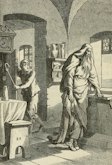Wavy Sunlight
A fairy tale by Ludwig Bechstein
A man was on his travels, and being devoid of provisions and of travelling monies, he did not know how he would pay his reckoning at the next inn. And then evil thoughts entered his mind – if someone appeared, carrying too heavy a load of money, he would be sure to lighten his burden for him. And in the thickest depths of the forest this traveller espied another traveller walking on ahead; quickening his steps, he soon caught up with him – and saw that the man he had caught up with was a Jew. He instantly thought: Jews always have money – and shouted at him, “Jew! Give me your money on the spot, or you’re a dead man.”
“God help me!” said the Jew, “I haven’t any more money than eight paltry farthings! What will you do with that? Will you commit a mortal sin before God and take a man’s life for eight farthings?”
“Jew, you’re lying! No Yid travels without money. Get your money out, or –!”
“Woe is me! Woe, I cry!” the Jew exclaimed in terror. “I haven’t any more than I told you!” – but the other traveller, in his rapacious frenzy, had stopped listening and he struck down the poor Jew, who cried as he sank to the ground: “I cry woe upon you, you murderer! The bright Sun will bring your misdeed to the light, the all-seeing Eye of the Firmament!”
With these words the Jew passed away, and now the murderer searched through all his pockets, but he found only a lank little leather purse, and inside it there was, indeed, no more and no less than eight rusty farthings. And then he regretted having committed the base murder – and when he looked at the sun, he started, for it stood in the sky blood-red all over, and he ran away in haste – but in the forest robins gathered, and brought flowers, and laid them gently on the countenance of the slain man, so the horrors of mankind would not disturb the solemn peace of the forest. The murderer travelled as far away from that place as he possibly could, and no longer could he look at the sun. On the next morning it seemed to him like an evil, evil dream – but the dream followed him a long time, and the sun constantly reminded him of the dying cry of the Jew he had slain. At length, he became easier in his mind, applied himself to work, and, because he was a sensible fellow most of the time, and very quiet and self-effacing in his ways, he won the affections of a master’s daughter, with whom he lived in conjugal felicity for a while. He did not often think of his atrocious deed now; he just had a certain fear of the sun. Yet in the end he asked himself: “Well, how will she, the dear Sun, manage to bring it to light? The Jew is long forgotten, I am many miles distant from that land – the Sun cannot speak, nor can she write. All this time I have been worried and afraid of her for nothing.”
One morning, the wife brought her husband his cup of coffee; he poured part of it from the cup into the saucer, and the sun happening to shine brightly in, there formed from the rippling liquid, by way of reflection, undulating, quivering waves of light diagonally above on the parlour ceiling, and the man raised his eyes. Believing himself to be alone, he said, “Sun, do you think you can bring it to light by drawing quivering waves up there?”
“What is it the Sun wants to bring to light, husband?” his wife asked out loud – and the man gave a violent start. When he faltered and would not confess anything, she vigorously pressed him to tell her. And the wife did not rest satisfied until he, having received from her a solemn assurance of the utmost silence, told her how he had once slain a Jew in a forest, who had cried out as he was dying: “The bright Sun will bring your misdeed to light, the all-seeing Eye of the Firmament!” and yet the Sun had brought nothing to light; it could do nothing but shine and warm and make waves on the wall or on the ceiling.
His wife listened to this, shuddered, and held her tongue; but her heart was fit to burst from the unholy secret which perturbed her night and day, and ever the sun reminded her of it anew. No longer able to keep it to herself, she told it to her best friend under the most sacred seal of secrecy – her friend passed it on, and soon it came to the ears of the judges. Then the murderer was apprehended and he confessed everything straight away; he was truly happy now that his secret was out in the open, and after being condemned to be put to the sword, he received his death blow with equanimity. In that same hour his garrulous wife ran into the loft and hanged herself from a beam.
The New Book of German Fairy Tales

Notes: Translated by Dr. Michael George Haldane.
Contains 50 fairy tales.
Author: Ludwig Bechstein
Translator: Dr. Michael George Haldane
Published: 1856